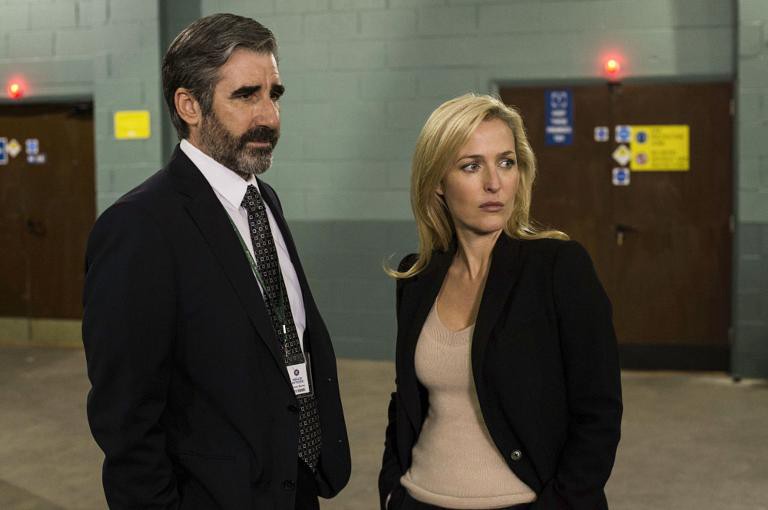
On its surface, you could fairly accuse “The Fall” of being yet another drama about a sexy, seductive serial killer (Jamie Dornan). On the other hand, you have offhand bits of dialogue like, “We’ve chosen to work in a masculine, paramilitary, patriarchal culture. Let’s not let it beat us.” Or, “It’s what women do with their anger. They harm themselves.”
This is the wonderfully complicated dichotomy of the BBC, now Netflix, series, returning for a third season — though its previous two were so perfectly paced, you have to wonder why anyone would want to continue it beyond that. The second season drama ended with Dornan’s Paul Spector shot, seemingly fatally, cradled in the arms of Stella Gibson (Gillian Anderson), the obsessive detective who’d worked so hard to bring him in.
It was a cliffhanger, one that seemed like the right way for this show to go out. I’m happy to have been proven wrong. The show’s third season is delving into a whole different, no less creepy arena of gender and culture as its characters struggle on in the aftermath of the shooting. I’ll avoid spoilers where possible; let’s just say that Paul survives and, for the first four episodes, is recuperating in various facilities. There is a development that flirts with jumping the shark, but the jury’s still out on that.
Much of the focus in these episodes is on the coping and survival mechanisms of the women who’ve come into contact with, and been damaged by Spector: Rose Stagg (Valene Kane), the woman who was rescued from the car trunk at the conclusion of the second season; Sally Ann (Bronagh Waugh), Spector’s wife; Katie Benedetto (Aisling Franciosi), the Spectors’ babysitter who’s been seduced by and is now obsessed with Paul; Danielle Ferrington, the cop who shot back at Spector’s assailant; and, chiefly, Gibson herself. The third season feels even more like an exploration of female trauma than the past two, with Gibson’s various interactions illuminating the ways in which women are harmed or harm themselves in the wake of violent assaults.

Anderson’s character is the filter through whom we see and process all of the women’s pain; she is also extraordinarily complex, a hyper-articulate fighter for women’s justice and an unapologetically sexual being. She sleeps with colleagues, including, most recently, her subordinate, detective Anderson (Colin Morgan) — whom you may remember accused her last season of sleeping with him because he looked like Paul Spector. (Which he does.)
Gibson remarks at one point that everyone who comes into contact with Spector is damaged by him and marvels that he’s still able to do it from a hospital bed. One of the main casualties is Rose who’s still trying to process her abduction and imprisonment. In a conversation with Gibson, Rose’s husband confesses that he’s angry at her for not resisting more when she was taken. “Men always think in terms of fight or flight,” she says. “In fact, the most common instinct in this type of situation is to freeze.” Moreover, she tells him, “if she went with him quietly, it’s because she was afraid for her life… in that state of fear, she might well have been compliant. But that doesn’t mean she consented.”
Gibson’s comments could be taken directly from the playbook of accusations lobbed at women who file rape charges, asking why they didn’t fight back harder. Calling out the difference between compliance and consent is a smart way of injecting a narrative about the ways in which sexual violence is often re-packaged under a framework of “well, she didn’t say no.” (A claim I’ve heard as recently as the discussion about Nate Parker’s trial, which I’ve been getting hate mail about, for writing that I won’t see “The Birth of a Nation.”)
The other huge tragedy at the start of season three is Spector’s wife, who’s still struggling to come to terms with learning about his crimes. Gibson’s colleagues plan to charge Sally Ann with helping him by giving him alibis, which Gibson cautions against. “Prosecuting his wife sends a clear signal we mean business, and no one involved will be getting off lightly,” her male colleague says brusquely. None except Gibson seem to comprehend that she, too, is a victim.
The hubris of the men who work around Gibson is a running theme in the show; early in this season, her superior (whom she had a relationship with) Jim Burns (John Lynch) tells her, “I told the chief I could manage you.” Which elicits one of those amazing Anderson semi-smiles.
Then, of course, there’s the thornier issue of how much Spector has gotten under Gibson’s skin; Anderson spoke to this in an interview about the new season: “She spent so much time getting into his mindset that she feels she understands him — she’s been so immersive she has gone into dark places herself. She gets into his focus — he’s a very dark and twisted psycho and sexual predator, and there is tension but it’s not sexual.” In one scene, she watches him in his hospital bed, breathing along with his respirator breaths. It’s chilling.
Above and beyond the show’s relevance to real-world gender and trauma issues, it’s still one of the most unsettling dramas to watch. There is something almost subconscious about the way this show makes you feel unease. It’s a deft trick and it’s not for everyone, but I still can’t get enough of it.







